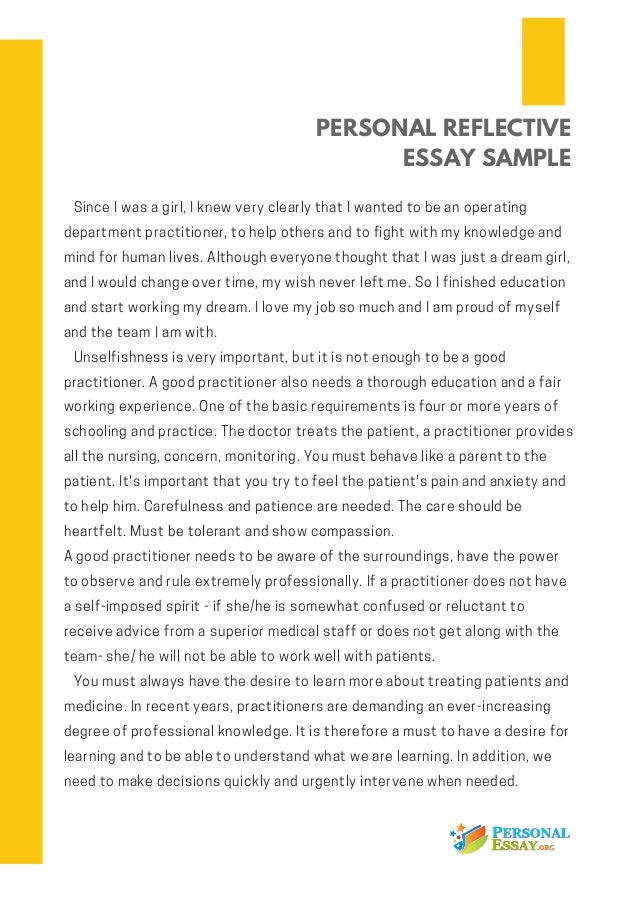
· What is reflective writing? Reflective writing is a useful tool to help you think about your learning, the process by which the learning occurs, or any other activity about which your instructor wants you to be aware of not only the end result of the learning, but how do you get to that place of accomplishment? Reflective writing is: documenting your response to experiences, opinions, events or new information; communicating your response to thoughts and feelings; a way of exploring your learning; an opportunity to gain self-knowledge; a way to achieve clarity and better understanding of what you are learning; a chance to develop and reinforce writing skills · Personal reflective In a piece of reflective writing the writer not only gives an account of an experience but examines what he or she thought and felt about it, both at the time and later on. Part
Reflective Writing Guide | UNSW Current Students
A great deal of your time at university will be spent thinking; thinking about what people have said, what you have read, what you yourself are thinking and how your thinking has changed. It is generally believed that the thinking process involves two aspects: reflective thinking and critical thinking. They are not separate processes; rather, they are closely connected Brookfield Figure 1: The Thinking Process adapted from MezirowSchonBrookfield There is neither a right nor a wrong way of reflective thinking, personal reflective writing, there are just questions to explore.
Figure 1 shows that the reflective thinking process starts with you. Before you can begin to assess the words and ideas of others, personal reflective writing need to pause and identify and examine your own thoughts. Doing this involves revisiting your prior experience and knowledge of the topic you are exploring.
It also involves considering how and why you think the way you do. The examination of your beliefs, values, attitudes and assumptions forms the foundation of your understanding. Reflective thinking demands that you recognise that you bring valuable knowledge to every experience.
It helps you therefore to recognise and clarify the important connections between what you already know and what you are learning. It is a way of helping you to become an active, aware and critical learner, personal reflective writing. Skip to main content. myUNSW Moodle Library Handbook Email. Current Students. Sign on Search Menu. Student Home Getting Started Accept your offer How to enrol Student ID card Set up your IT Orientation Week.
Exams Results. The Nucleus: Student Hub. Psychology Health Service. Accommodation Health services Sport and gym. Moodle myUNSW Email Microsoft Office myLibrary Careers portal Change your password Need help? Student Support Academic Skills Writing skills Essay and assignment writing.
Figure 1: The Thinking Process adapted from MezirowSchonBrookfield Reflective thinking Reflection is: a form of personal response to experiences, situations, events or new information. a 'processing' phase where thinking and learning take place, personal reflective writing. What is reflective writing?
Reflective writing is: documenting your response to experiences, personal reflective writing, opinions, events or new information communicating your response to thoughts and feelings a way of exploring your learning an opportunity to gain self-knowledge a way to achieve clarity and better understanding of what you are learning a chance to develop and reinforce writing skills a way of making meaning out of what you study Reflective writing is not: just conveying information, instruction or argument pure description, though there may be descriptive elements straightforward decision or judgement, e.
about whether something is right or wrong, good or bad simple problem-solving a summary of course notes a standard university personal reflective writing. See next: How do I write reflectively?
Writing, critical thinking, exams and more. Personalised support and advice for you. Academic Skills Referencing. Essay and assignment writing, personal reflective writing.
Essay and assignment planning. Answering assignment questions. How do I write reflectively? Examples of reflective writing. Engineering and science. Other links and resources. Reading and note-taking.
Contacts and appointments. Back to top. Website Feedback Contacts Sitemap Personal reflective writing Guide Student Home. UNSW Sydney NSW Australia Authorised by Deputy Vice-Chancellor Academic UNSW CRICOS Provider Code: G TEQSA Provider ID: PRV ABN: 57 Page last updated: Monday 23 December
How to Write a Reflection Paper - Full Reflection Essay Writing Guide - Peachy Essay ��
, time: 5:14How Do I Write a Good Personal Reflection

· What is reflective writing? Reflective writing is a useful tool to help you think about your learning, the process by which the learning occurs, or any other activity about which your instructor wants you to be aware of not only the end result of the learning, but how do you get to that place of accomplishment? · Personal reflective In a piece of reflective writing the writer not only gives an account of an experience but examines what he or she thought and felt about it, both at the time and later on. Part · The initially obvious matter from what is personal reflective writing the internet site is its particulars, indicated on the significantly left as Digital Harlem Every day Everyday living This straight away informs the reader about the website’s concentration, indicating that readers can easily pick no matter whether to progress with the site or not
No comments:
Post a Comment